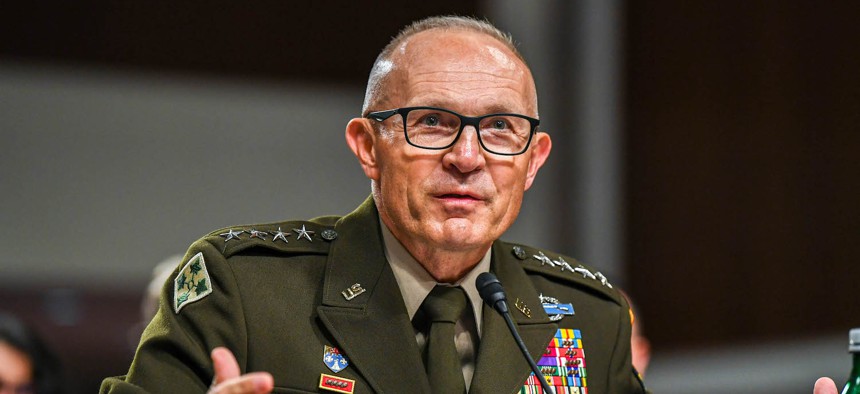
Army Vice Chief of Staff Gen. Randy George answers questions from members of the Senate Armed Services Committee during his confirmation hearing, July 12, 2023. U.S. Army / Sgt. David Resnick
Army is now the 2nd service without a Senate-confirmed leader
At the “relinquishment of authority” ceremony, senior military leadership blasted Sen. Tuberville’s hold on nominations.
Just after cannons boomed to mark the beginning of the relinquishment of authority ceremony for the Army’s chief of staff, defense officials delivered a different kind of broadside: a rebuke to the Senator preventing Gen. Randy George from officially taking the job.
“The failure to confirm our superbly qualified senior uniformed leaders undermines our military readiness,” said Defense Secretary Lloyd Austin.
These officers' “careers and lives are now in limbo because of this unprecedented hold,” added Army Secretary Christine Wormuth.
Sen. Tommy Tuberville, R-Ala., has blocked the Senate from confirming senior military officers since February. Tuberville says his action is in protest of a Pentagon policy that funds travel for reproductive healthcare services, including abortion.
Because of the hold, the Army joins the Marines in not having a Senate-confirmed leader. It is the first time the Army has not had a Senate-confirmed leader since 1972, when it was helmed for three months by an acting chief of staff.
The hold has prevented the confirmation of 300 generals, admirals, and policy officials, Pentagon spokesman Brig. Gen. Pat Ryder told reporters on Tuesday.
George will take over outgoing Army Chief of Staff Gen. James McConville’s responsibilities, but without McConville’s title. The White House has selected Lt. Gen. James Mingus for George’s old job as vice chief of staff, though that nomination is also on hold.
During celebrations Friday, the Army also marked the handover of responsibility from Sergeant Major of the Army Michael Grinston to his replacement, Command Sergeant Major Michael Weimer.
Standing beneath a cool gray sky, unusual in Washington’s recent searing summer heat, McConville commemorated his four years as head of the service to roars of appreciation from old West Point classmates.
Amid George and McConville’s mentions of the support they have received from their spouses and children, Pentagon leaders emphasized the pressure Tuberville’s nominations hold has put on military families.
The partners of military officers who are waiting on an official nomination must now either pay out of pocket to move their children to the military officer’s new assignment location or split their family, Deputy Pentagon Press Secretary Sabrina Singh has said.
This particularly affects school-age children, whose parents must decide whether to unenroll them from their old districts in anticipation of moving to new military bases.
“We need to end all of this uncertainty for our military families,” said Wormuth. “It is upending the lives of far too many of their spouses, children, and loved ones,” agreed Austin.







